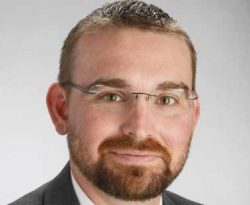Jessie Gills, M.D.
The Future through Academics
 There was never a doubt in Dr. Jessie Gills’ mind that he would pursue a position in New Orleans to practice urology. But when the president of the Society of Urologic Oncology (SUO) offers you a fellowship, you go. Even if it means moving to Kansas.
There was never a doubt in Dr. Jessie Gills’ mind that he would pursue a position in New Orleans to practice urology. But when the president of the Society of Urologic Oncology (SUO) offers you a fellowship, you go. Even if it means moving to Kansas.
Dr. Gills just wrapped up fellowship training at the University of Kansas Medical Center and will join Scott Delacroix, M.D., to make LSU the first practice in the state with more than one SUO-trained urologic oncologist. A much-needed addition he says, because unfortunately, urologic oncologists are in demand.
“When you look at some of the leading cancers (prostate, kidney, bladder), they’re all in the top 10 cancers in the U.S.,” Dr. Gills says. “So there’s a real need, and definitely a need at LSU.”
Drs. Gills and Delacroix specialize in the detection and treatment of urologic malignancies and utilize cutting-edge technology like robotic minimally invasive surgery, outpatient focal cancer therapy along with the newest immunotherapies and targeted-drug therapies to maximize effectiveness against cancer and minimize side effects.
They make it their mission to critically assess patients for optimal individualized treatment choices and not treat based on what therapies are newest or en vogue but what is the best treatment for their patients.
All of this knowledge and experience gets passed on to their LSU medical students and residents.
On one level, being hired as an academic physician at LSU is the fulfillment of a lifelong goal. But after more than a decade of medical training, Dr. Gills says, it’s just business as usual. “The things you do day in and day out, staying educated on a constantly moving target, staying up-to-date on what’s best for your patient … I don’t see it as much of a change in role as it is a change in title.”
For Dr. Gills and his colleagues, there are many rewards to being a professor and a physician. “Without academics, the practice of medicine would not advance,” he says. “The most rewarding thing about academic medicine is you get to guide the practice of urology; the future of urology and future urologists.”
The benefit of additional fellowship training is a not only learning new techniques and treatments but also a better understanding of the biology of a disease. “Understanding cancer biology helps guide treatment,” he says. “You have to know how a specific disease needs specific treatment versus just a cookbook approach.”
This knowledge has contributed to making cancer more of a lifelong management issue instead of the death sentence it once felt like. “Urologic oncologists have the privilege of being able to make an intervention and a lasting change for a lot of people,” Dr. Gills says. “Hopefully over the course of my career we get closer to chronic disease management.
We’re getting there for some urologic malignancies that in the not-too-distant past were thought incurable.”
From an early age: Dr. Gills admired his pediatrician and started volunteering in the emergency room in tiny Calhoun, La., in high school and college. He eventually worked there and thought he would go on to become an ER physician.
A funny thing happened on the way to the ER: In medical school at LSU, Dr. Gills found working with the urologists a career-changing experience. “Their desire to involve students, to teach and practice at such a high level, it really inspires you to look for the best in yourself as well,” he says.
Collaboration at LSU: Having two SUO-trained urologic oncologists is a huge advantage for LSU. “Without a doubt, it’s always good to have someone to bounce cases off of,” Dr. Gills says. “Discussing management and having someone around to help with difficult surgeries is a huge plus.” As for that second surgeon being Dr. Delacroix, Dr. Gills says that he is an ideal partner because he is “someone who works tirelessly as an advocate for his patients to do the right thing even when it’s not the easy thing.”
In his spare time: Dr. Gills conducts research on understanding the predictors of response to immunotherapy since only about a quarter of patients with advanced urologic cancers respond to the treatment.
It’s all worth it: Dr. Gills says he’s actually better at handling criticism than praise. “[But] it’s always nice on those days when a patient gives you a hug,” he says. “It re-instills in you that this is a making a difference in people’s lives.”
He must love NOLA: Arriving in summer with a 3-year-old and his pregnant wife will be an immediate reminder that he’s back in the swampy South. But, he reports, he can’t wait to get back to “food and family.” Good seafood is hard to find in the middle of the country.
Medical School: LSU
Internship: Ochsner, General Surgery
Residency: LSU/Ochsner, Urology
Fellowship: The University of Kansas Medical Center, Urologic Oncology
LSU Network Clinic
3601 Houma Blvd., Ste. 302
Metairie, LA 70002
(504) 412-1600
